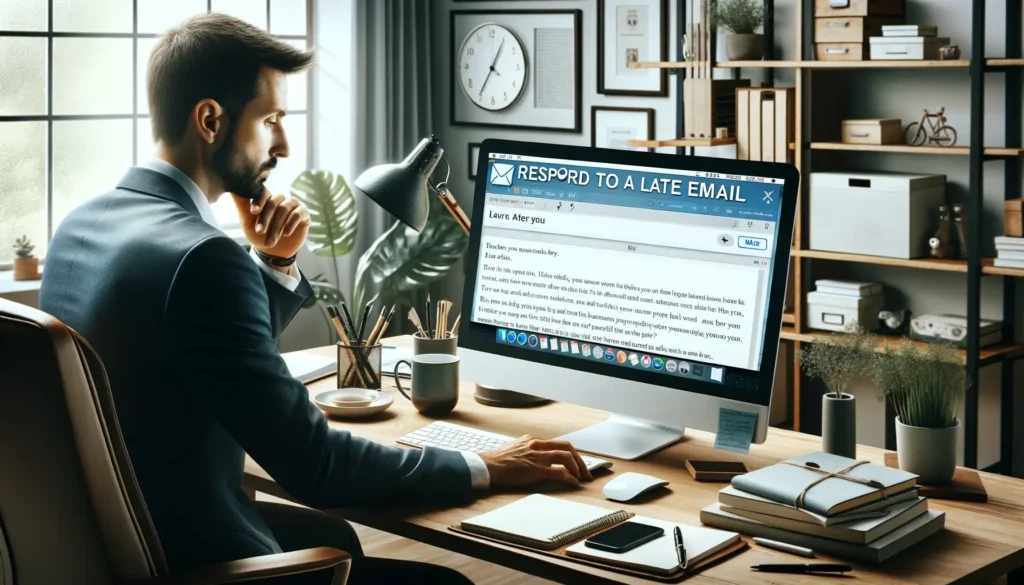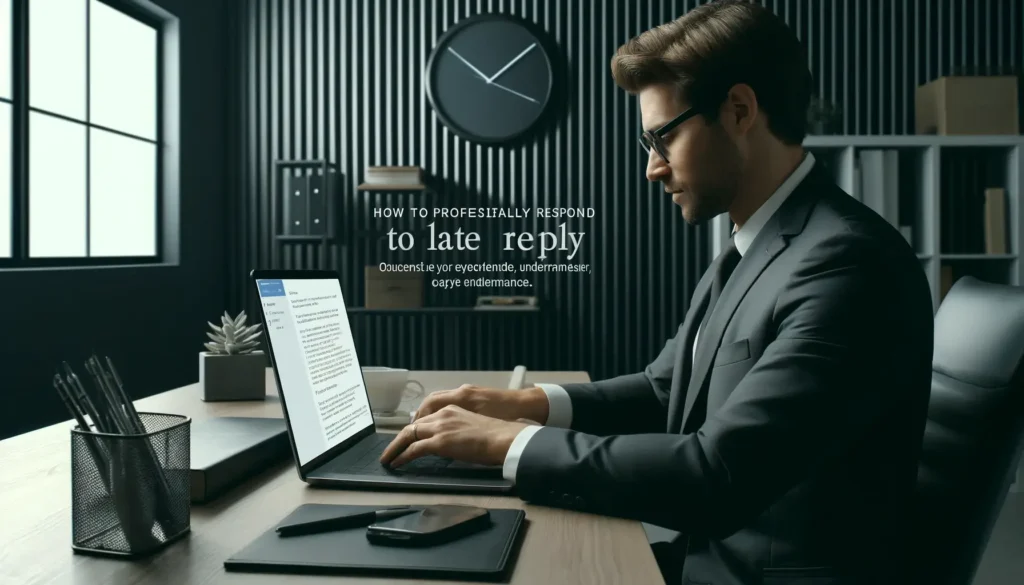To respond professionally to “Sorry for the late reply,” acknowledge the delay, express understanding, and provide helpful information or move the conversation forward. Striking a balance between friendliness and professionalism is key in your response.
It is important to show your understanding of the situation and maintain a positive tone. By addressing the delay and offering a concise, respectful reply, you can assure the recipient that their message is valued. This approach fosters effective communication and demonstrates your commitment to maintaining good relationships in your professional interactions.
Remember to keep your tone polite and understanding while providing the necessary information to move the conversation forward.
How To Respond to Sorry For The Late Reply Professionally
Respond graciously when someone apologizes for a late reply by acknowledging understanding and emphasizing a focus on moving forward positively. Express appreciation for their message and maintain an open, understanding tone in your reply. Remember to stay professional and emphasize the importance of clear communication.
How To Respond To “sorry For The Late Reply” Professionally
Responding to apologies for late replies in a professional manner is essential to maintain good communication and relationships. A well-crafted response shows understanding and respect for the sender. Here are some effective ways to handle such situations:
- Acknowledge the Apology: Let the sender know that their apology is acknowledged and accepted.
- Express Understanding: Show understanding for the delay and reassure the sender that it’s not an issue.
- Thank Them: Express gratitude for the message and their patience, ensuring them that you will address their concerns promptly.
Acknowledge The Apology
It’s important to acknowledge the sender’s apology to ease any potential discomfort and assure them of a positive response. This can be done by thanking them for their understanding and recognizing their commitment to open communication.
Express Understanding
Understanding the sender’s apology is crucial. Demonstrating empathy for the delay and expressing that it’s not an inconvenience helps in maintaining a positive and professional communication channel. By acknowledging the delay, you also affirm that promptness is valued.
Thank Them
Thanking the sender for reaching out and their understanding of the delay shows appreciation and assures them of your commitment to addressing their concerns. Offering appreciation conveys a sense of respect and gratitude for their patience and understanding.
Best Respond Sorry For The Late Reply
To professionally respond to “sorry for the late reply,” acknowledge the delay and express gratitude for their understanding. Briefly explain the reason for the delay and assure them of your commitment to prompt communication in the future.
Best Ways To Respond To “sorry For The Late Reply”
- Graciously acknowledge the apology by expressing understanding of the situation: This shows empathy and professionalism in your response.
- Briefly explain the delay without delving into unnecessary details: Keep it concise and to the point to maintain clarity.
- Express appreciation for the sender’s message: Show gratitude for their communication, reinforcing a positive tone.
- Respond to the original message or query: Transition smoothly into addressing the initial purpose of the communication to move the conversation forward.
- Conclude with a courteous closing remark: End your response on a positive note, maintaining professionalism and fostering a good rapport with the sender.
Tips For Crafting A Polite Response
- Use polite language and a friendly tone: Strive to maintain a pleasant and respectful demeanor throughout your reply.
- Apologize if necessary, but do so judiciously: If the delay was due to unforeseen circumstances or genuine oversight, a brief apology can be appropriate.
- Offer reassurance of your continued availability: Assure the sender that you are willing and ready to assist or engage further, ensuring open lines of communication.
- Avoid making excuses or placing blame: Focus on addressing the current interaction positively without deflecting responsibility.
- End with a positive note and invite further communication: Leave the door open for future interactions and maintain a warm, approachable attitude.
Respond To A Late Email

When responding to a late email, it’s important to acknowledge the delay and express understanding. You can reply professionally by thanking the sender for their message and providing your response with a brief explanation for the delay. This will help maintain a positive and courteous communication.
Responding To A Late Email:
When you find yourself in a situation where you need to , it’s essential to handle the situation professionally and effectively. Here’s how you can master the art of replying to a delayed email with grace and professionalism:
Here are ten responses to a late email.
“Thank you for your email. Apologies for the delay in responding.”
“I appreciate your message. Sorry for the delayed response.”
“Thanks for reaching out. My apologies for not replying sooner.”
“I’ve received your email. Sorry for my late response.”
“Thank you for getting in touch. Sorry for the delay in getting back to you.”
“I apologize for the delayed response to your email.”
“Sorry for the late reply. Thank you for your understanding.”
“Thanks for your patience. Apologies for the delay in replying.”
“I appreciate your email. Sorry for my delayed response.”
“Apologies for the late reply. Thank you for reaching out.”
Tips For Responding To A Late Email:
- Acknowledge the Delay:
- Let the sender know that you acknowledge the delay in your response.
- Provide a Brief Explanation:
- Briefly explain the reason for the delay, if necessary.
- Express Apologies Sincerely:
- Apologize for the delayed response and show empathy for any inconvenience caused.
- Address the Original Email:
- Address the content of the original email promptly to maintain the flow of communication.
- Offer Assistance:
- Extend your willingness to assist further if needed to make up for the delay.
- Set Expectations:
- Communicate any necessary follow-up actions or timelines to keep the conversation moving forward.
Responding to a late email is a common scenario in professional settings, and handling it with professionalism and courtesy can help maintain a positive rapport with your contacts. Remember to apologize sincerely, provide necessary explanations, and ensure that the conversation continues seamlessly despite the delay.
Sorry For Late Reply To A Friend

Apologies for the delayed response. It took a bit longer than expected, but I appreciate your patience. Let’s catch up soon!
How To Respond To A Friend Who Apologizes For Your Late Reply
It’s natural to fall behind on messages from friends, and while they may understand, it’s important to respond appropriately to maintain a healthy relationship. Here are the best ways to respond when a friend apologizes for your late reply:
You surely don’t want your friend to feel neglected, and it’s essential to convey your regret for the delay in response. The aim is to assure them of your genuine interest in the conversation.
Here are ten apologies for a late reply to a friend.
“Hey [Friend’s Name], sorry for the delayed response. Life got a bit hectic!”
“Apologies for not getting back to you sooner, [Friend’s Name]. I’ve been swamped lately.”
“Sorry for the late reply, [Friend’s Name]. I didn’t mean to keep you waiting.”
“Hey there, sorry for the delayed response. Things have been a bit chaotic on my end.”
“I’m sorry for not replying sooner, [Friend’s Name]. I appreciate your patience.”
“Hey, sorry for the delay in getting back to you. I hope you’re doing well!”
“Apologies for the late reply, [Friend’s Name]. I’ve been juggling a lot recently.”
“I’m sorry for not responding earlier, [Friend’s Name]. Let’s catch up soon!”
“Sorry it took me a while to get back to you, [Friend’s Name]. Thanks for understanding!”
“Hey [Friend’s Name], I apologize for the delay. Let’s plan something soon to catch up!”
- Express appreciation: Let your friend know that you appreciate their understanding and apologize for the late response.
- Share the reason: You can briefly explain why you were unable to respond promptly and assure them that it wasn’t intentional.
It’s crucial to convey warmth and sincerity in your response. A genuine and understanding reply can strengthen your bond with your friend, fostering a sense of empathy and support between you.
When responding to your friend, craft your message in a way that reflects your personality while staying true to yourself. The key is to maintain authenticity and warmth in your words, which can resonate with your friend and foster a genuine connection.
Remember, these guidelines should not restrict your natural communication style. Your response should feel natural and human, reflecting your personality and sentiments. This can help in nurturing the friendship further.
Responding to a friend who apologizes for your late reply requires genuine warmth, understanding, and sincerity. By expressing appreciation, offering a brief explanation, and maintaining authenticity in your response, you can reaffirm your bond and strengthen the friendship.
Respond To A Guy Says Sorry For The Late Replay

Thank you for your understanding. I appreciate your apology for the delayed response. Let’s continue the conversation and move forward from here.
Responding To A Guy Who Says Sorry For The Late Replay
Have you ever received a message with the inevitable “Sorry for the late reply” line? It can be frustrating, especially when you’re expecting a prompt response. However, it’s essential to maintain professionalism and handle the situation gracefully. We’ll explore some tips on how to respond professionally to someone who apologizes for their delayed reply.
Here are ten responses to a guy who apologizes for a late reply.
“No worries at all! Thanks for getting back to me.”
“Hey, it happens! Glad to hear from you now.”
“No problem! I appreciate you getting back to me.”
“Thanks for letting me know! Let’s continue our conversation.”
“No need to apologize! I understand.”
“Hey, all good! Let’s pick up where we left off.”
“Thanks for reaching out! Let’s catch up.”
“No sweat! Let’s move forward with our discussion.”
“It’s all good! I appreciate your response.”
“No problem at all! Let’s keep in touch
Show Understanding And Empathy
When someone apologizes for their late response, it’s crucial to acknowledge their apology and show understanding. Emphasize that you understand how life’s demands can sometimes get in the way, allowing them to feel at ease.
Express Appreciation
Don’t forget to express gratitude for their apology. Indicate that you appreciate their consideration in acknowledging the delay. It will help maintain a positive tone throughout the conversation.
Keep Your Response Positive And Brief
When crafting your response, it’s important to stay positive and keep it concise. Remember, the goal is to maintain professionalism and not dwell on the delay. Your reply should be easy to read and straight to the point.
Offer Assurance
To reassure the person that their message is important to you, let them know that their response is appreciated regardless of the delay. Assure them that their input or request will be addressed promptly and effectively.
Provide A Brief Update (if Necessary)
If the late reply caused a delay in progress or information sharing, this could be an appropriate time to offer a brief update. However, ensure it’s necessary and directly related to the reason for the initial contact. Being proactive in providing information can help mitigate any potential frustrations.
Suggest Alternative Communication Channels (if Applicable)
In some cases, suggesting alternative communication methods can demonstrate flexibility and willingness to accommodate their needs. For example, if email responses are frequently delayed, offering a phone call or face-to-face meeting could be a feasible solution.
End On A Positive Note
Conclude the conversation by leaving a positive impression. Express confidence in resolving any outstanding matters and reiterate your appreciation for their understanding. Remain open to further discussion and make sure they feel valued.
By following these guidelines, you can respond professionally to someone who apologizes for a delayed reply. Remember, maintaining a positive and empathetic approach will help build and strengthen professional relationships.
Formal Response To Sorry For The Late Reply
Apologies for the delayed response. Thank you for your understanding. I appreciate your patience and look forward to our continued correspondence.
Have you ever found yourself in a situation where you receive a message, but due to unforeseen circumstances or a busy schedule, you are unable to reply promptly? It happens to the best of us, and when you finally get around to responding, it’s essential to do so professionally.
In this section, we will provide you with a guide on how to respond formally to someone apologizing for the late reply.
When crafting a formal response to someone who has apologized for the late reply, it’s crucial to strike a balance between being understanding and maintaining professionalism. By following the tips outlined below, you can navigate this situation gracefully:
Here are ten formal responses to someone apologizing for a late reply.
“Your apology is acknowledged and appreciated. Let’s proceed with our discussion.”
“Thank you for your apology. Let’s continue our conversation without delay.”
“Your apology is accepted. Let’s address any outstanding matters promptly.”
“Apology accepted. Let’s ensure timely communication moving forward.”
“Thank you for acknowledging the delay. Let’s move forward with our discussion.”
“No need to dwell on the delay. Let’s focus on the matter at hand.”
“Thank you for your apology. Let’s ensure better communication in the future.”
“Your apology is noted. Let’s work together to avoid delays in the future.”
“Apologies accepted. Let’s move forward and address any issues accordingly.”
“Your apology is appreciated. Let’s prioritize timely responses going forward.”
- Express gratitude: Begin your response by expressing appreciation for their understanding and acknowledging their apology.
- Briefly explain the delay: Provide a concise explanation for the delayed response, focusing on a valid reason without delving into unnecessary details.
- Apologize (if necessary): If the delay was due to an oversight on your part or any inconvenience caused, a genuine apology might be in order.
- Respond to their initial message: Address the main points or concerns mentioned in their original message. This demonstrates that you have carefully considered their communication.
- Offer assistance or further clarification: If applicable, extend your help or offer to provide any additional information they may require.
- Reiterate appreciation: Conclude your response by expressing gratitude once again for their understanding and patience.
By following these steps, you can respond gracefully and professionally to apologize for the late reply. Remember, honesty, gratitude, and clear communication are key elements in maintaining professional relationships.
Friendly Response Sorry For The Late Reply
Respond to a late reply with understanding and positivity to maintain professionalism. Acknowledge the delayed response and express a friendly attitude in your message. Initiating the conversation with empathy can help strengthen relationships and communication.
Friendly Response To “Sorry For The Late Reply”
It’s completely normal to have a delayed response, and acknowledging the late reply graciously is always appreciated. Here are some friendly ways to respond when someone apologizes for a late reply:
Responding to a delayed message doesn’t have to be complicated or formal. Keep it friendly and straightforward by expressing your understanding.
Here are ten friendly responses to someone apologizing for a late reply:
“No worries at all! Life happens. Let’s catch up now!”
“Hey, no problem! I understand how things can get busy.”
“Thanks for getting back to me! Let’s dive into our conversation.”
“Hey, it’s all good! Glad to hear from you now.”
“No need to apologize! Let’s continue where we left off.”
“Hey, thanks for the heads up! Let’s chat now.”
“No sweat! Let’s pick up where we left off.”
“Thanks for letting me know! Let’s keep the conversation going.”
“Hey, don’t worry about it! Let’s move forward.”
“No problem at all! Let’s catch up on everything.”
- Express Understanding:
- Assure the individual that it’s totally fine and that you appreciate them reaching out.
- Provide Context:
- If necessary, explain how you can relate to their situation by mentioning a time when you also experienced a delayed response.
- Reassure Connection:
- Let them know that you’re glad to hear from them, emphasizing the importance of keeping the conversation going.
By acknowledging the late reply and responding in a friendly manner, you maintain a positive and approachable dialogue with the individual. Keep the communication open and welcoming.
Remember, responding to a late reply should always be warm and understanding, creating a positive connection with the sender.
Frequently Asked Questions On How To Respond to Sorry For The Late Reply Professionally
How Can I Respond Professionally To A Late Reply?
To respond professionally to a late reply, acknowledge the delay, apologize sincerely, provide a brief explanation if necessary, and offer a resolution or next steps. Emphasize your commitment to communication and responsiveness, and thank the recipient for their understanding and patience.
Is It Necessary To Apologize For A Late Reply?
Yes, it is necessary to apologize for a late reply. By acknowledging the delay and apologizing sincerely, you show respect for the recipient’s time and demonstrate professionalism. It helps to maintain a positive relationship and build trust with the person you’re communicating with.
How Do I Explain The Reason For My Late Reply?
When explaining the reason for your late reply, be honest and succinct. Provide a brief explanation without going into excessive detail. If possible, offer an alternative solution or suggest a time frame for a more timely response to mitigate any inconvenience caused by the delay.
What Should I Include In My Response To A Late Reply?
In your response to a late reply, it’s important to include an acknowledgment of the delay, a sincere apology, a brief explanation if necessary, a resolution or next steps, and gratitude for their understanding. This shows professionalism, responsibility, and a commitment to effective communication.
Conclusion
Responding professionally to a “sorry for the late reply” message is essential for maintaining good communication. By acknowledging the delay, expressing gratitude, and providing a brief explanation, you can enhance your professional image. Remember to prioritize prompt responses in the future for seamless interactions.



